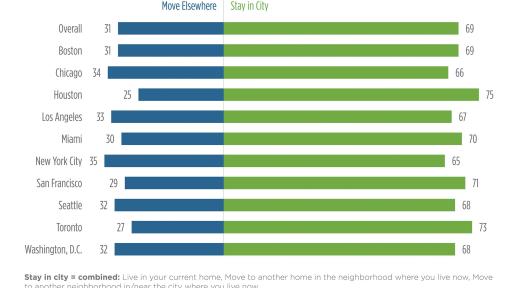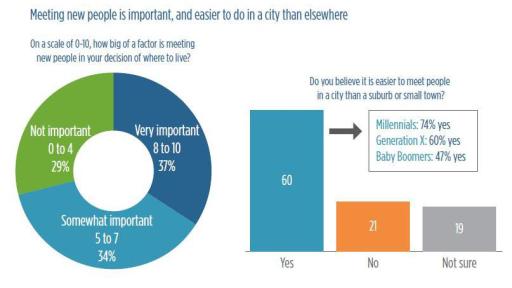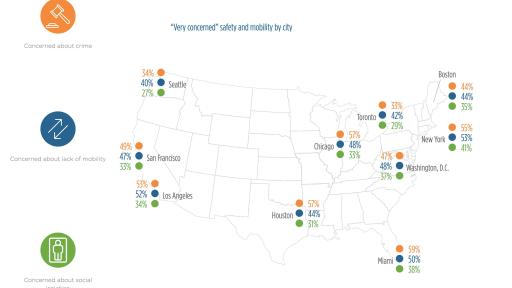Big city dwellers young and old see themselves living in their city at age 80+
2017 Aging in Cities Survey of 3,000 residents of 10 large cities finds:
- Most city dwellers want to live in a city, not a suburb or rural area, as they age
- Quality health care will be their number one priority for choice of location
- Social interaction and diversity are seen as major positives for aging in cities
- Maintaining mobility and access to what the city has to offer are top concerns
- Residents identify options needed to keep aging residents in urban communities
Sept. 26, Toledo, Ohio – High rise buildings in the heart of downtown may be replacing far flung golf course communities for the coming generation of senior citizens. Results of the 2017 Aging in Cities survey, commissioned by Welltower (NYSE: HCN), a leader in health care real estate infrastructure, find that seven out of 10 big city dwellers (and eight of out 10 Baby Boomers) want to live in their existing big city when they are 80+ years old.
“The results of the 2017 Aging in Cities survey challenge preconceived ideas about aging and show that most contemporary city dwellers want to age in their communities,” said Thomas DeRosa, Welltower’s Chief Executive Officer. “With the rapid growth of the aging of the population, these preferences are going to shape urban living for years to come. We must find ways to adapt city life to these new demands of residents of big cities, where current options are limited.”
Tom DeRosa Discusses the FindingsThe survey of 3,000 adults of all ages living in 10 large North American cities revealed what will matter most to their “future selves” when they are 80+ years old. The findings highlight why city dwellers believe their city – versus a suburb or rural area – is the best option as they age:
- Access to high-quality health care is by far the first priority when considering where they want to live at 80+ and most believe big cities need more options for senior care
- While city dwellers expect digital technologies to positively impact their aging, they want to interact with their health care professionals in person (at a medical office or at-home care)
- Mobility is an issue for city dwellers – 84 percent list loss of mobility as a huge concern as they age; the transportation options offered in big cities help alleviate that concern
- One in five city dwellers expects to get purpose out of full- or part-time work at age 80+ and 60 percent believe the aging population will create silver economy jobs and opportunities aimed at senior consumers
- Eight out of 10 city dwellers want to make new friends at age 80+, and six in 10 want time for romance and to have an active sex life at that age – they believe cities offer the best options for relationships (60 percent say it is easier to meet people in the city)
- Eighty-four percent of respondents think it’s important for them to live in a community with a diverse population, with “a mix of different age groups” as the top criterion
- Eighty-one percent of city dwellers are open to living in an urban senior living community
- The majority of respondents said their city is currently livable for older residents, but they differed on why:
- Residents of Chicago, New York, San Francisco and Washington, DC ranked their city’s public transportation as the best equipped feature for older residents
- Residents of Boston, Seattle, Houston and LA ranked public parks and neighborhood amenities like libraries and community centers as the best equipped feature
- Residents of Miami and Toronto ranked public transportation and parks and neighborhood amenities equally as best equipped feature for their elderly populations
- Cities received high marks for public parks, local libraries and community centers, but to keep seniors engaged in their communities, residents believe cities could improve:
- neighborhood safety programs
- community events for seniors
- intergenerational activities
- safe bike lanes and running paths
- free broadband/high speed internet in public places, and
- special services for older adults/people with disabilities.
For detailed survey results, visit agingincities.com.
Methodology: The survey was conducted online among an audience of 3,000 adult participants across 10 cities (300 each): Boston, Chicago, Houston, Los Angeles, Miami, New York, San Francisco, Seattle, Toronto and Washington, DC. The data was stratified by generation in each city and weighted to key demographics representative of city residents. The survey was conducted May 16- June 1, 2017.
About Welltower
Welltower Inc. (NYSE:HCN), an S&P 500 company headquartered in Toledo, Ohio, is driving the transformation of health care infrastructure. The company invests with leading seniors housing operators, post-acute providers and health systems to fund the real estate infrastructure needed to scale innovative care delivery models and improve people’s wellness and overall health care experience. Welltower™, a real estate investment trust (REIT), owns more than 1,400 properties in major, high-growth markets in the United States, Canada and the United Kingdom, consisting of seniors housing and post-acute communities and outpatient medical properties. More information is available at www.welltower.com.
Media contact:
Anna Blyth, 312-368-7536
[email protected]
City high rises may replace golf course communities for seniors according to 2017 Aging in Cities Survey Tweet





